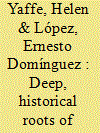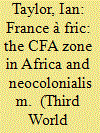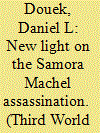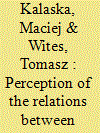| Srl | Item |
| 1 |
ID:
155141


|
|
|
|
|
| Summary/Abstract |
Colonialism, imperialism and anti-imperialism have been decisive in shaping Cuban political identity for 150 years. US determination to control Cuba, consistent with the Monroe Doctrine, had a strong economic rationale even before Spain was defeated in the War of Independence in 1898. Debate raged between Cubans who aspired to true independence and an annexationalist minority, who favoured union with the US. The Platt Amendment imposed on Cuba by the US in 1903 ‘reduced the independence and sovereignty of the Cuban republic to a myth’. Between then and the Revolution of 1959 Cuba was effectively first a protectorate and then neo-colony of the US, which dominated the Cuban economy, politics and foreign policy. Tackling the terrible socioeconomic and political effects of Cuba’s subjugation under the Spanish empire and then US imperialism necessitated a radical transformation of the Cuban economy, political institutions and power structures. The transition to socialism inevitably meant confronting US imperialism – and vice versa. Since 1959, US imperialism, with its powerful allies in the right-wing exile community based in Miami, have relentlessly tried to destroy the Revolution and Cuban socialism. The issue of imperialism remains key today, in the post-Fidel, President Trump era.
|
|
|
|
|
|
|
|
|
|
|
|
|
|
|
|
| 2 |
ID:
166693


|
|
|
|
|
| Summary/Abstract |
Over 50 years after 1960’s ‘Year of Africa’, most of Francophone Africa continues to be embedded in a set of associations that fit very well with Kwame Nkrumah’s description of neocolonialism, where postcolonial states are de jure independent but in reality constrained through their economic systems so that policy is directed from outside. This article scrutinises the functioning of the Communauté Financière Africaine (CFA), considering the role the currency has in persistent underdevelopment in most of Francophone Africa. In doing so, the article identifies the CFA as the most blatant example of functioning neocolonialism in Africa today and a critical device that promotes dependency in large parts of the continent. Mainstream analyses of the technical aspects of the CFA have generally focused on the exchange rate and other related matters. However, while important, the real importance of the CFA franc should not be seen as purely economic, but also political.
|
|
|
|
|
|
|
|
|
|
|
|
|
|
|
|
| 3 |
ID:
154476


|
|
|
|
|
| Summary/Abstract |
In 1998, South Africa’s Truth and Reconciliation Commission (TRC) held hearings that investigated the possibility of foul play in the plane crash that killed Mozambican President Samora Machel on the night of 19 October 1986, near Mbuzini, South Africa. Eight persons testified in these special Section 29 hearings, held in camera because they dealt with events that remained politically volatile in the post-apartheid era. The recently declassified transcripts from these hearings strongly corroborate previous evidence indicating that the apartheid security forces caused Machel’s plane to crash, thereby eliminating one of colonialism’s most outspoken foes.
|
|
|
|
|
|
|
|
|
|
|
|
|
|
|
|
| 4 |
ID:
141892


|
|
|
|
|
| Summary/Abstract |
People register and process stimuli every day, creating an image of space–time reality involving multifaceted relations between various states. The authors have created a database consisting of articles from the periodical Le Monde diplomatique from 1954 to 2009. This paper focuses on investigating how strong relations are between former colonial powers and developing countries. The authors present an index showing the frequency of coincidence of opinion-shaping content in articles about one of the selected world powers and a developing country; they next establish a quantitative reference to dependency and world-systems theories.
|
|
|
|
|
|
|
|
|
|
|
|
|
|
|
|